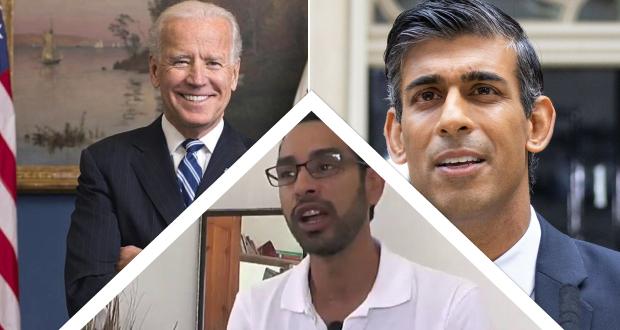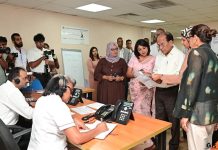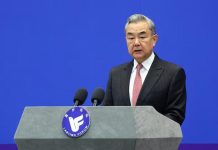
Africa-Press – Mauritius. Dear President Joseph R. Biden & Prime Minister Rishi Sunak, It is with enormous respect that I write to you as a dedicated human rights and political activist in Mauritius, and as leader of a new political party in Mauritius “Nouveau Front Politik” (NFP), with regards to the decolonization of the islands of the Chagos Archipelago, including Diego Garcia, and their rightful return under the sovereignty of Mauritius.
I would like to request, and implore you to act with the utmost urgency to freeze all negotiations between the United States of America and Great Britain with the current Government of Mauritius (MSM Government) with regards to the Chagos Archipelago.
The Chagos Archipelago, also known as the British Indian Ocean Territory (BIOT), is a group of seven atolls located in the Indian Ocean. The archipelago was originally part of the colony of Mauritius, but it was illegally separated from Mauritius prior to independence and made a separate British colony in 1965.
In 1968, the United States and the United Kingdom signed a treaty leasing the largest atoll, Diego Garcia, to the United States for the construction of a military base.
The lease was set to expire in 2016; however, it was extended until 2036. Tragically, at the time of the annexation of Chagos, from Mauritius, there was a native population living on the Archipelago, known as the Chagossiens.
These people were forcefully and illegally displaced from their native homelands in order to pave the way for Mauritian independence: which at the time was essentially dependent on Mauritius agreeing to the annexation of the Chagos from her territory as a prerequisite to being granted independence from Great Britain.
Regardless of the fact that this process was in breach of international laws, over the course of the past decades, the UK has maintained control of the islands ever since their annexation in 1965 – despite numerous calls for their return to Mauritius.
Today, however, we are at a new crossroads with regard to Mauritius’ sovereignty over the Chagos. This is due to the fact that: In February 2019, the United Nations General Assembly (UNGA) adopted a resolution calling on the United Kingdom to return the Chagos Archipelago to Mauritius “as an integral part of its territory” within six months.
The resolution was adopted by a vote of 116 in favor, 6 against, and 56 abstentions. The United Kingdom, along with the United States, Australia, and Hungary, voted against the resolution
In May 2019, the International Court of Justice (ICJ), the United Nations’ highest court, issued an advisory opinion stating that the detachment of the Chagos Archipelago from Mauritius in 1965 was a violation of international laws. The ICJ called on the United Kingdom to end its administration of the archipelago and to return it to Mauritius “as rapidly as possible”
In November 2019, the UNGA adopted another resolution reaffirming its call for the return of the Chagos Archipelago to Mauritius and expressing “deep concern” over the continued refusal of the United Kingdom to comply with the ICJ’s advisory opinion.
The resolution was adopted by a vote of 116 in favor, 6 against, and 55 abstentions. The United Kingdom, along with the United States, Australia, and Hungary, voted against the resolution
In December 2020, the UNGA adopted a third resolution on the decolonization of the Chagos Archipelago, reaffirming its call for the immediate return of the archipelago to Mauritius and expressing “grave concern” over the continued refusal of the United Kingdom to comply with the ICJ’s advisory opinion.
The resolution was adopted by a vote of 116 in favor, 6 against, and 55 abstentions. The United Kingdom, along with the United States, Australia, and Hungary, voted against the resolution
In summary, the United Nations has adopted three resolutions calling on the United Kingdom to return the Chagos Archipelago to Mauritius and expressing concern over the continued refusal of the United Kingdom to comply with the ICJ’s advisory opinion on the matter.
The United Kingdom, along with a few other countries, has consistently voted against these resolutions. Based on these UN resolutions, it is clear today more than ever that the detachment of the Chagos was carried out in violation of international laws and has been a source of ongoing conflict, great suffering, and controversy.
Instead of going into the graphic and controversial details of the abhorrent and forced displacement of a native people from their homeland due to the illegal annexing of their territories, I would like to take this opportunity to commend both the United States and Great Britain for the great strides we are seeing today with regards to resolving this ongoing human rights crisis and violations of international laws.
The great strides I speak of is the fact that in recent months the UK and USA have declared their willingness to come to the table to negotiate the return of the Chagos Archipelago to Mauritius.
With this new development, today, our three Nations stand poised to make history: ready to make amends to an atrocity borne from the necessity of a bygone-era, that of the Cold War and the geo-politics of that time.
Today, more than ever, there is a need to make amends for past deeds, and find workable, comprehensive, and mutually beneficial solutions for the future well-being of our countries, our peoples, and our longterm shared interests and shared goals.
Solutions that take into account and at the same time honor our shared values and shared commitments to democracy, human rights, and the international rule of law.
Today, we at NFP commend the political will, and humble resolve, recently shown by the United States and Great Britain to restore and make the necessary amends to this past injustice: that of the plight of the native displaced souls of the Chagos Archipelago—who deserve not only to return home, but to have their territorial integrity restored to its rightful place within, and as part of, the territories of the Republic of Mauritius.
Dear Mr President & Mr Prime Minister, Given the long history of the controversy, and the suffering entailed, of the annexation of the Chagos from Mauritius, it is not without a sense of great regret that I write to you in order to implore that you freeze any current and ongoing negotiations between our Nations with regards to the Chagos Archipelago.
Ironically, and perhaps fittingly, my call has its roots in precisely our shared ideologies of democracy and human rights: we at NFP wish to see a resolution to this matter that is not only just and fair to the people of the United States, and Great Britain, as well as the people of the Chagos, but also has the same sense of social justice, and righteous good cause for the people of the Republic of Mauritius as well.
Unfortunately, under the present climate, and with the current political regime in power in Mauritius, this will not be possible. It is our opinion at NFP that the current Mauritian Government, led by Prime Minister Pravind Jugnauth and his MSM party, has no legitimate right to conclude any long-term agreements with regard to the Chagos Archipelago with your respective Governments.
The reasons for this are legitimate and simple: we at NFP believe that any proposed terms of agreement between our Nations on the Chagos question must first be plebiscite by the people of Mauritius, by way of one of two possible manners:
1. A direct referendum voted upon by the people of Mauritius, or 2.
A general election in which any such proposed general terms of an agreement are presented specifically in an electoral manifesto for the people of Mauritius to decide.
Much like the “founding fathers” of the Independence of Mauritius did not have the right to negotiate away, and annex, the Chagos Archipelago from the territory of Mauritius prior to independence, the same applies today in 2023: a potentially illegitimate government, quite possibly the most highly contested Government in the history of the Republic of Mauritius, does not have the right to unilaterally negotiate such an important agreement with regards to the sovereignty of Mauritius without prior approval from the people of Mauritius by one of the two ways already mentioned above.
I would like to take this opportunity to also point out that it is not uncommon for negotiations over the return of annexed territories to former colonies be put on hold or delayed until after new elections have taken place in the former colony, and provide you with some examples.
This is typically done for a variety of reasons, such as to allow the newly elected government to have a say in the negotiations or, perhaps more importantly, to ensure that the outcome of the negotiations reflects the will of the people as expressed through the electoral process—just as I have suggested above.
Another important aspect with regard to negotiations between the UK and US and current MSM regime in Mauritius that the US and UK should take note of is that the people of Mauritius are quite weary with regard to Pravind Jugnauth’s MSM regime when it comes to our territorial integrity.
This is due to the fact that the current MSM Government Regime, deemed by many as illegitimate and tyrannical, has already encroached on Mauritius’ sovereignty, potentially illegally and unconstitutionally, when it comes to the island of Agalega and the Indian military base that is currently being built there today since the “secret” agreements on Agalega between the MSM Government of Pravind Jugnauth and India were made.
To date, almost a decade later, none of the terms of the Agalegan agreement have been made public, and although observers worldwide have already rightly assessed the installations on Agalega as being of the nature of “military installations”, the current MSM Government regime continues to vehemently deny this blatant truth.
These are some of the primordial reasons for why I am calling upon, and imploring, the Governments of the United States of America and of Great Britain to “put on hold” any negotiations with Mauritius with regard to the Chagos Archipelago, until after the next General Elections in Mauritius: which are due to be held in approximately 18 months, but that many believe will be held much sooner, potentially even over the course of the next 3-6 months.
Pravind Jugnauth’s MSM Government is very likely an outgoing regime, one that risks getting beaten brutally by 60-0 in the upcoming parliamentary general elections.
Should any agreement be reached between what many deem to be a criminally negligent, illegitimate, and treasonous Government and the US and UK with regards to Chagos, the truth is that the UK and US may very well find themselves in a situation where a newly elected Government, a legitimate Government with the full will of the people of Mauritius behind her, reneges on any and all such potentially unconstitutional and unauthorized agreements with regard to the Chagos Archipelago.
A good example of how a situation like that could play out is to compare it with the US political system: where, the President of the United States and his administration are free to negotiate any manner of treaties and agreements with foreign Nations, however, unless they are ultimately ratified by the US Congress, they are unenforceable, and are effectively rendered null and void.
This is not something that anybody wants to see happen, least of all the USA and UK: therefore, the best possible solution, for all parties involved, is to freeze negotiations, and let them resume when a government that has been elected by the majority of Mauritians takes power – unlike the current Jugnauth MSM Regime, which was elected with only 28% of eligible voters and 37% of the votes nationwide.
Dear Mr President & Mr Prime Minister, It is important to respect the sovereignty of Mauritius and ensure that the democratically elected representatives of the Mauritian people, with a clear mandate to not only negotiate on the return of Chagos to Mauritius – but that also presents proposed terms of agreement to the Mauritian people through the electoral process, make any decisions regarding the Chagos Archipelago.
This is especially important given the long and complicated history of the archipelago and the significant emotional and cultural attachments that many Mauritians have to it.
Additionally, negotiating with the next government will ensure that any agreement is grounded in the priorities and concerns of the Mauritian people, rather than being imposed from the outside. This will help to build trust and ensure that any potential solutions are sustainable and acceptable to all parties involved.
Negotiating with the next government will also allow for a more transparent and inclusive process, with all stakeholders having the opportunity to have their voices heard and their concerns addressed.
This is essential for building a durable and equitable solution that takes into account the needs and interests of all parties involved. The people of Mauritius have the right to self-determination and to have their voices heard on this matter.
By waiting until after the elections, we can ensure that the views of the newly elected government with an explicit mandate from the people to negotiate are taken into account.
The Chagos Archipelago has a complex history and its return to Mauritius will have significant implications for the country’s future. It is important that the next government be fully informed about the issue and has the opportunity to consider all of the options and their potential consequences.
Finally, it is important to respect the democratic process and allow the people of Mauritius to choose their representatives and have a say in the decisions that will shape their country’s future.
By negotiating with the next government, we can ensure that the voices of the people of Mauritius are heard and that their interests are taken into account.
I therefore, again, urge you to consider my request to immediately freeze all negotiations concerning Chagos with Mauritius, and to negotiate the future of the Chagos Archipelago only after the next general elections in Mauritius and with the next government.
This approach will respect the sovereignty of Mauritius and ensure that all agreements are grounded in the priorities and concerns of the Mauritian people, while also fostering a more transparent and inclusive process.
I hope and trust that you will consider these points as you address this issue and to work towards a fair and just resolution that respects the rights and interests of the people of Mauritius.
For More News And Analysis About Mauritius Follow Africa-Press






